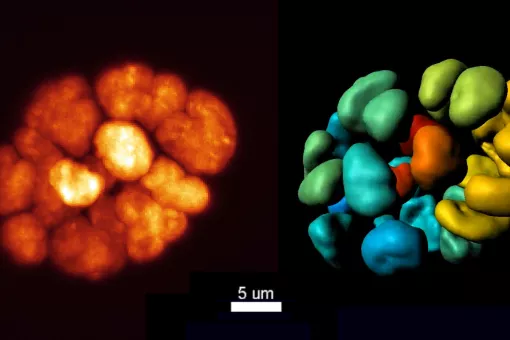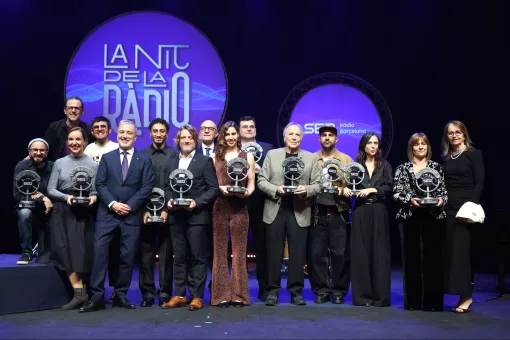Images
- The project to be carried out at IRB Barcelona has been awarded €2M to address an understudied mutation type known as structural variants.
- Using machine learning approaches, as well as innovative sequencing techniques, the laboratory will study the role of these mutations in cancer and other conditions.
- This is the second ERC Grant to be awarded to Dr. Supek and the 23rd to IRB Barcelona.
Today the European Research Council (ERC) has announced the award of its Consolidator grants to 321 researchers across Europe, 91 in the field of life sciences. Spain has been awarded 24 grants of the total and ranks third among the EU countries regarding the number received. Of these 24, 10 have been given to centres in Catalonia.
Dr. Fran Supek, head of the Genome Data Science lab at IRB Barcelona and ICREA researcher, has been awarded an ERC Consolidator Grant amounting to €2M to carry out the STRUCTOMATIC project over the next five years. Dr. Supek’s project will focus on studying structural variants, an impactful mutation type involving the modification of large DNA regions, which can change the regulation of multiple genes at once. Structural variants, also called rearrangements, cause cancer and certain other genetic diseases and might play roles in ageing.
In particular, structural variants participate in the progression of late-stage cancers, such as metastatic ones. The researchers led by Dr. Supek will focus on studying the role of these variants in different types of cancer, including lung, prostate, head and neck, ovarian, oesophagus, and triple-negative breast cancers, as well as sarcoma.
“This grant is an outstanding opportunity to increase our understanding of this very common and yet poorly studied type of mutation and how it relates to cancer evolution,” says Dr. Supek. “The support of the ERC makes a true difference in the consolidation of laboratories like ours, allowing us to focus on ambitious, exciting scientific questions and to perform at our best. The rigorous evaluation of project applications means the ERC is a benchmark for promoting excellence in science,” he adds. This year, 14.4% of the ERC Consolidator applications received funding from the Council.
The challenge of tackling structural variants
Structural variants are modifications of large DNA fragments. They can be classified into distinct subtypes, such as inversions (when a section detaches from the DNA and reattaches in reverse order), copy number alterations (when a specific fragment is duplicated or deleted), and translocations resulting in gene fusions (when two genes rearrange and end up forming a new one). The first breakthrough precision cancer drug (Imatinib/Gleevec) was developed to target a rearrangement–the so-called "Philadelphia chromosome"–that causes chronic myelogenous leukemia via gene fusion. This drug presented remarkable capacity to inhibit the cancer cell growth, while sparing healthy cells, which do not have the fusion. Apart from cancer, some types of structural variants are related to other genetic disorders, including Huntington’s disease, some forms of Amyotrophic Lateral Sclerosis, Friedrich ataxia, and other neurological and muscular disorders.
Structural variants are common in cancer cells and they drive tumour development through their effects on cancer genes. The STRUCTOMATIC project will address the mutational mechanisms that give rise to structural variants (such as “replication stress”, which commonly occurs in rapidly dividing cancer cells). The project will study the regions of the genome most susceptible to such mutations, and also the involvement of these structural alterations in cancer progression. In particular, the team aims to determine the structural variants that are are cancer "drivers", meaning that they cause cancer to grow and might be therapeutic targets, and those that are mere "passengers" with little effect on the tumour.
Short reads vs. long reads, a project enabled by the latest sequencing techniques
One of the reasons why structural variants have been poorly studied is that they are not easy to identify from standard genome sequencing data. Evidence suggests that two-thirds of these alterations in the human genome may go undetected. To overcome this limitation, the Genome Data Science lab will use a new sequencing technique, the so-called "long-read sequencing". The most common sequencing technique used, known as short-read, works by breaking the genomic DNA into small fragments and simultaneously “reading” them. However, short reads are often ambiguous and they cannot be easily localized ("mapped") onto the correct part of the human genome, so this standard technique is limited with respect to detecting DNA rearrangements. Considered a next-generation approach, long-read methods allow the sequencing of long DNA fragments in one go, thereby facilitating the recognition of structural variants.
In addition to genome sequencing and computational analysis, the research group will perform experimental studies and use the CRISPR-Cas9 and Cas12a gene editing to modify human cells in culture by switching off certain protective genes. Such editing in these experiments will cause "replication stress", as occurs in tumours, and generate structural variants in the genome of these cells. By sequencing the genome, the researchers will link the type of replication stress to various patterns of genomic mutations, thus helping to unravel the processes that occur in cancer.
This ERC Consolidator grant will support the laboratory for the next five years and allow the hiring of 5 people with profiles spanning from PhD students to postdocs and lab technicians. It will also promote collaboration with clinicians from several countries across Europe, including Italy, Norway, and Finland, as well as local collaborations in Barcelona, including with the group led by former IRB Barcelona Alumna Dr. Alexandra Avgustinova at the Sant Joan de Déu Research Institute.
In 2017, Dr. Supek was awarded an ERC Starting grant for his project HYPER-INSIGHT, which addresses the role of an extreme burden of somatic mutations in human cells with deficient DNA repair processes. This is the 23rd ERC grant awarded to IRB Barcelona: Advanced grants (7), Consolidator grants (5), Starting grants (5), and Proof of Concept grants (6).
About IRB Barcelona
The Institute for Research in Biomedicine (IRB Barcelona) pursues a society free of disease. To this end, it conducts multidisciplinary research of excellence to cure cancer and other diseases linked to ageing. It establishes technology transfer agreements with the pharmaceutical industry and major hospitals to bring research results closer to society, and organises a range of science outreach activities to engage the public in an open dialogue. IRB Barcelona is an international centre that hosts 400 researchers and more than 30 nationalities. Recognised as a Severo Ochoa Centre of Excellence since 2011, IRB Barcelona is a CERCA centre and member of the Barcelona Institute of Science and Technology (BIST).







